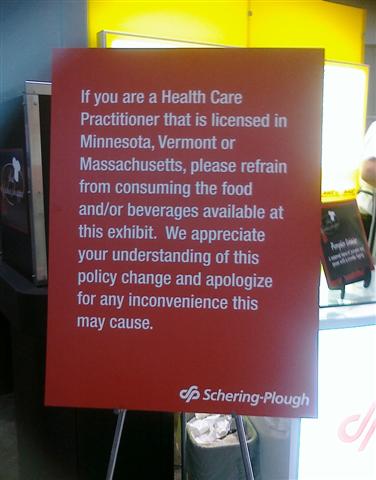Publishers sometimes send me books in hopes I’ll review or at least mention them. I occasionally attend free advance screenings of new movies (typically law-related documentaries) that filmmakers hope I’ll write about. This site has an Amazon affiliate store which has from time to time provided me with commissions after readers click links and proceed to purchase items, though it’s been almost entirely inactive for years. I get invited to attend the odd institutional banquet whose hosts sometimes give away a free book or paperweight along with the hotel meal. I’ve been sent “cause” T-shirts and law firm/support service provider promotional kits over the years, pretty much a waste of effort since I don’t much care for wearing such T-shirts and am not exactly famed for posts that sing the praises of law firms or their service providers.
Under new Federal Trade Commission guidelines in the works for some time, I could apparently get in trouble for not disclosing these and similarly exciting things. In addition, the commission’s scrutiny will extend to areas less relevant to this site, such as targeted Google advertising and results-not-typical testimonials.
Robert Ambrogi at Legal Blog Watch finds it hard to see why the blogosphere has raised such a big fuss about these rules. After all, the rules (to be precise, “guidelines” backed by government lawyers with relevant enforcement powers) make clear that nondisclosure of a single minor freebie will not in itself suffice to trigger liability but instead will be counted “among several factors to be weighed” in evaluating the continuum of behavior by individuals engaging in social media (it seems the rules also apply to Twitter, Facebook, and guest appearances on talk shows, to name a few). FTC enforcers will engage in their own fact-specific, and inevitably subjective, balancing before deciding whether to press for fines or other penalties: in other words, instead of knowing whether you’re legally vulnerable or not, you get to guess.

Like most authors I know, I wind up donating most review copies I receive to local library sales or other charities. (As Ann Althouse and Cory Doctorow both hint, the accumulation of review copies for disposal quickly becomes more of a burden than otherwise, which is why I spend much more time trying politely to talk publishers out of sending me copies than trying to talk them into it.) But in an extraordinary interview that should be read in its entirety, the FTC’s point man on the rules, Richard Cleland, surreally suggests bloggers should instead return review copies to the publishers — who don’t want them back! — after taking a look.
Among interesting disclosure posts by well-known bloggers: Tyler Cowen/Marginal Revolution, Virginia Postrel/DeepGlamour, Martin Schwimmer/Trademark Blog. Other notable reactions: Jack Shafer, Slate (“The FTC’s mad power grab. … preposterous … The guidelines have to be read to be believed.” ); Patrick at Popehat (“Next on the FTC agenda: fines for hotlinking and failure to hat tip … Yes, I believe in the slippery slope.”); Jeff Jarvis, Amy Alkon, Dan Gillmor (“you get the sense of a government-gone-wild travesty…unworkable in practice”), HIPAA Blog (“unconstitutional”), Washington Examiner (editorial: “No self-respecting journalists should lend their endorsement to [the FTC’s planned Dec. 1-2 workshop on journalism], and neither should any professional journalism organization.”)
Finally, for the last word, Ann Althouse:
The most absurd part of it is the way the FTC is trying to make it okay by assuring us that they will be selective in deciding which writers on the internet to pursue. That is, they’ve deliberately made a grotesquely overbroad rule, enough to sweep so many of us into technical violations, but we’re supposed to feel soothed by the knowledge that government agents will decide who among us gets fined. No, no, no. Overbreadth itself is a problem. And so is selective enforcement.
(& welcome readers from Instapundit, Ron Coleman (who points out that he was on this issue earlier than any of us), ShopFloor, Dave Zincavage, Jonathan Adler/Volokh, Megan MacArdle/The Atlantic, Darleen Click/Protein Wisdom, Declan McCullagh/CBS (with some very kind words), Mickey Kaus (scroll to P.S. “I’d link to…”)). And (10/21): Jason Kottke’s Kottke.org, K2/DaddyTypes.
[Followup posts here and here.]
Filed under: accolades, bloggers and the law, Federal Trade Commission, FTC endorsement rules

 Docblogger White Coat just
Docblogger White Coat just 
